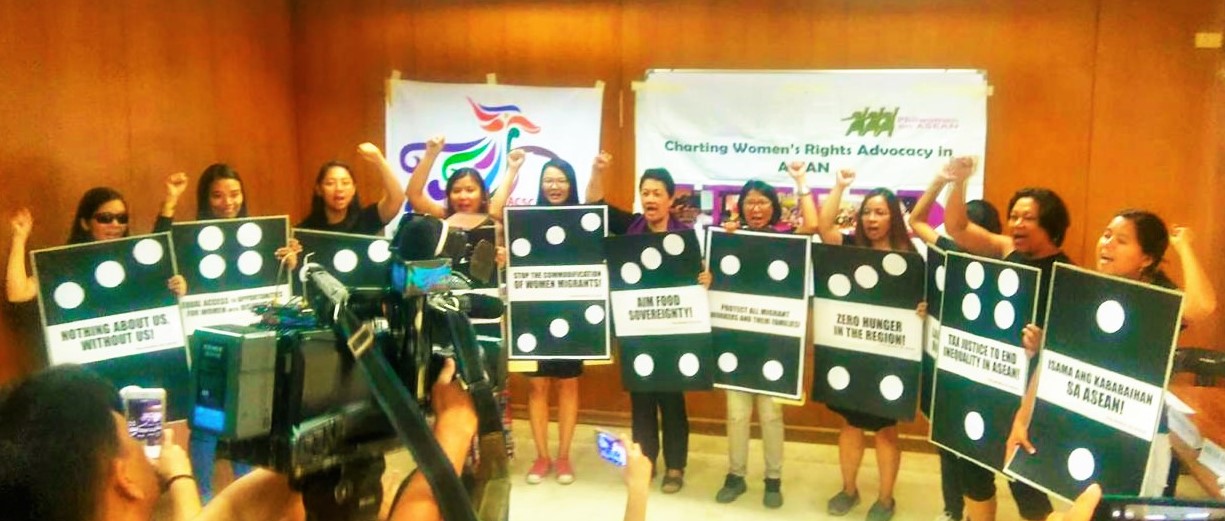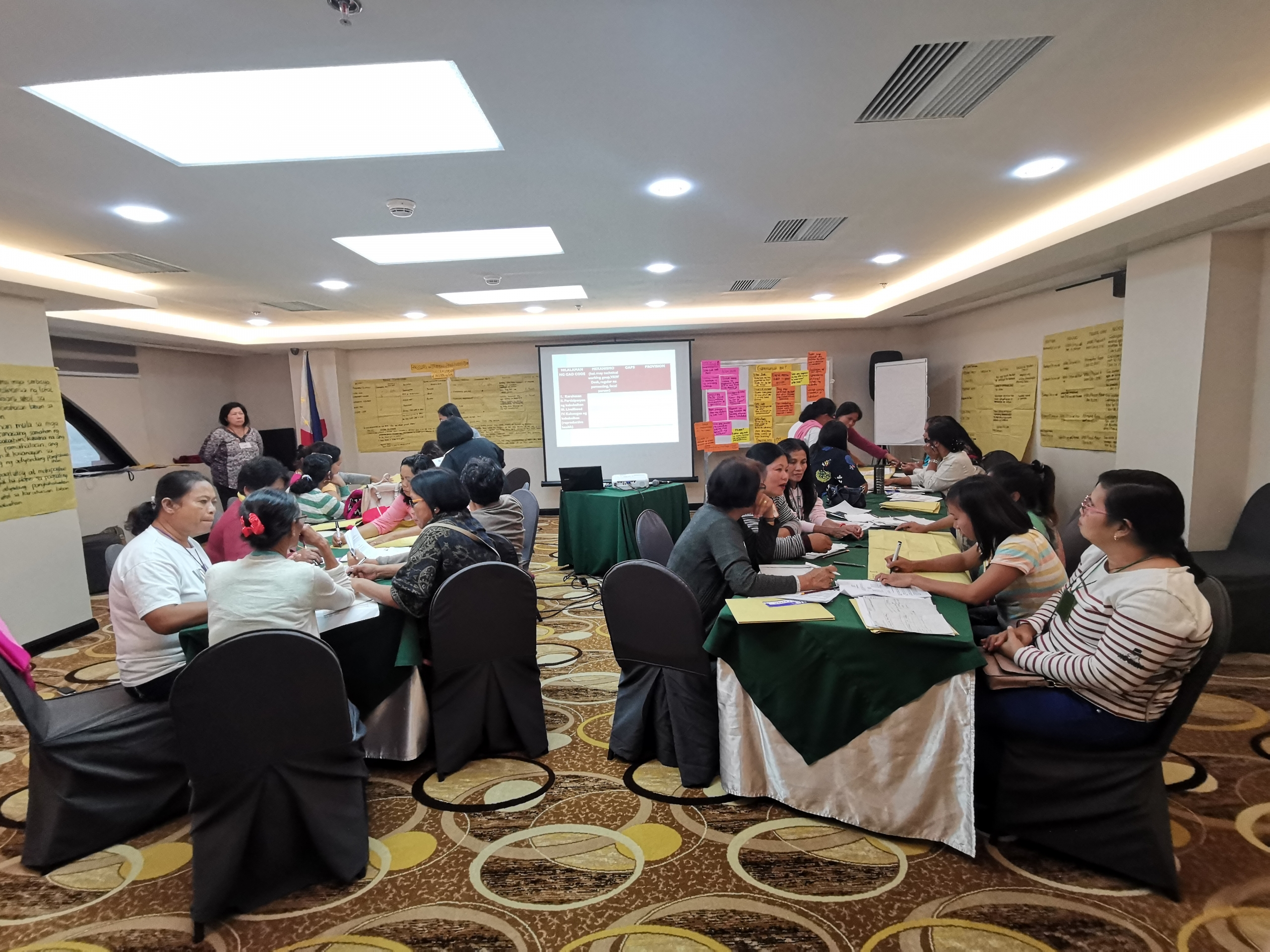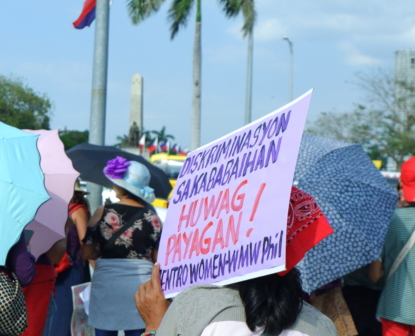Project
Amplifying Voices of Marginalised Sectors
-
Amount Funded
120,000 EUROProject Duration
01 Aug 2017 - 31 Jul 2019 -
-
Lead organisation
-
The Women’s Legal and Human Rights Bureau Inc. (WLB), formerly Women’s Legal Bureau, was established in 1990 by feminist human rights advocates wanting to effectively address the prejudices suffered by Filipino women before the law and in the legal system. WLB emerged as the first consciously feminist legal organisation pushing for feminist legal advocacy as a strategy for the promotion and defence of women’s human rights. Its mission today is primarily to actively engage in advocacy together with other women’s groups to transform the law and the legal system, and engage its institutions, towards the empowerment of women, especially in the grassroots. This is being pursued in furtherance of the right of women to self-determination and the advancement of their dignity, rights and leadership, in concert with national and global movements for alternative development.
-
Organisation
The Women’s Legal and Human Rights Bureau Inc. (WLB), formerly Women’s Legal Bureau, was established in 1990 by feminist human rights advocates wanting to effectively address the prejudices suffered by Filipino women before the law and in the legal system. WLB emerged as the first consciously feminist legal organisation pushing for feminist legal advocacy as a strategy for the promotion and defence of women’s human rights. Its mission today is primarily to actively engage in advocacy together with other women’s groups to transform the law and the legal system, and engage its institutions, towards the empowerment of women, especially in the grassroots. This is being pursued in furtherance of the right of women to self-determination and the advancement of their dignity, rights and leadership, in concert with national and global movements for alternative development.
-
Project
Nothing About Us Without Us: Amplifying Voices of Marginalised Sectors in Masbate, Zambales and Samar is a 2-year project by the Womens Legal and Human Rights Bureau (WLB) implemented in Luzon and Visayas regions. It focuses on strengthening the capacities of women facing exploitation and abuse, women in disaster situations, indigenous women, and young women, in demanding the state’s obligation to address systemic discrimination against women, especially marginalised women. This is done by working closely with three people’s organisations that take the lead in influencing local governments to support the meaningful participation of women in development processes.
WLB works closely with the Ayta (IP) women leaders in Cabangan, Zambales and the women victims-survivors of typhoon Haiyan in Marabut Samar, all under its core programme – the Engendering the Barangay Justice System (EBJS) Program. The EBJS led to capacitating community women to demand accountability of the local government. It also yielded critical partnerships with local government units and agencies that supports and actively facilitates women organising in their localities. Hence, WLB seeks to replicate these gains and expand the reach through the Voice-funded project.
-
-
Nothing About Us Without Us: Amplifying Voices of Marginalised Sectors in Masbate, Zambales and Samar is a 2-year project by the Womens Legal and Human Rights Bureau (WLB) implemented in Luzon and Visayas regions. It focuses on strengthening the capacities of women facing exploitation and abuse, women in disaster situations, indigenous women, and young women, in demanding the state’s obligation to address systemic discrimination against women, especially marginalised women. This is done by working closely with three people’s organisations that take the lead in influencing local governments to support the meaningful participation of women in development processes.
WLB works closely with the Ayta (IP) women leaders in Cabangan, Zambales and the women victims-survivors of typhoon Haiyan in Marabut Samar, all under its core programme – the Engendering the Barangay Justice System (EBJS) Program. The EBJS led to capacitating community women to demand accountability of the local government. It also yielded critical partnerships with local government units and agencies that supports and actively facilitates women organising in their localities. Hence, WLB seeks to replicate these gains and expand the reach through the Voice-funded project.
-
“According to the women of both Samar and Zambales, more than learning spaces for them, activities organised by WLB under the VOICE project are their safe spaces. KASAMA and Samar always assured WLB that the women attending trainings were there willingly and not by coercion, and the same messages were conveyed during evaluation parts of each activity.”

Women’s Legal and Human Rights Bureau’s (WLB) activities enabled 95 local women leaders in Samar and Zambales to discover their capabilities in: (1) public speaking; (2) facilitating; (3) critically engaging with government representatives; and (4) critically analyzing the situation of women in their communities to better surface women’s needs, issues, and concerns. This is just one of the wonderful results from its influencing project which aimed to strengthen the capacities of women in vulnerable situations to demand the state’s obligation to address gender-based discrimination and violence.
Even if these activities are organized by WLB, the women participants were also given active roles such as facilitators, reporters, documenters, etc. The activities also sharpened their skills in referring cases to the proper authorities, and acting as a support group for women and girl victims of violence within and even outside their respective communities. Implementing the project has emphasised how safe spaces can be rare for marginalised communities of women; from stories shared in different activities, women’s experiences with domestic violence, sexual violence, etc. are “too personal” to be discussed at mixed organisations, or that women themselves minimise the impact of domestic violence they experience.
Another notable achievement of the project was the development of the two core groups in Zambales (KASAMA) and Samar (UKTO) over the course of the project. Formed during the first quarter of the project implementation in 2017, these core groups are a select group of women from each area who act as the focal persons in the area, lead communications and coordination with WLB, and co-lead in project implementation. Both organisations have grown and implemented their own activities and initiatives which led to the following:
- With KASAMA’s core expansion which took place in April 2019, they initiated a forum on 9262 with two objectives: 1) to introduce the law on violence against women and children to women in Cabangan, and; 2) to practice their skills in facilitation.
- Moreover, KASAMA was able to introduce and engage with different local government units/barangays. These engagements gained the verbal commitment of the municipal and barangay agencies, the Municipal Social Welfare and Development, and the Committee on Budget in particular.
- On 8 August 2019, a member of the Legaspi Women’s Organization (LWO) of Barangay Legaspi, Marabut, Samar, one of the partner women’s organizations in Marabut, Samar, used her knowledge and training on the Anti-Rape Law to decisively put her brother to jail for the crime of attempted rape against her daughter despite her other family members dissuading her from doing so.
- In April 2019, ten women leaders of Kababaihang Samahan ng Maporac (KASAMA) facilitated a forum on RA 9262 (the Anti Violence against Women and their Children) with the aim of creating a safe space for women in Cabangan to learn about and share stories of VAW. Prior to the forum, core members were able to speak to more than 150 individuals in Cabangan in settings such as riversides while doing laundry, at meetings for 4Ps, etc. Aside from members of Ayta Abellen’s council of elders, KASAMA reached out mostly to women, introducing RA 9262 and encouraging women to ask questions regarding VAW and the law.
Though engaging with government agencies have proven difficult and challenging, WLB strives to bridge that gap in order for these safe spaces for women to not be limited and expand, from their gatherings to their own communities and families, and even government agencies.
Links to outputs
A newsletter containing stories of changes by the women of KASAMA and UKTO:
Click here to read the newsletter.
Linking & Learning co-created outputs:
Future plans
The community partners organised in Zambales and Samar applied for a Voice Empowerment grant that was approved in 2019. They continue to develop their organisations and lobby for women’s issues at local, national, and global levels.
- News





